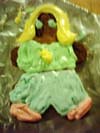I'm very lucky that my job has introduced me to books and authors that I wouldn't normally hear of in the mainstream media. Besides Tatiana de Rosnay and Jeffrey Zaslow (who's signed book is waiting to be read shortly), none of the authors have been featured very prominently on my local bookstores or featured in the myriad of newspapers that I get on my desk each day. I doubt I would have even glanced at My Father's Paradise: A Son's Search for His Family's Past by Ariel Sabar as I walked by the rows of spines on the bookshelves.
My Father's Paradise spans decades, centuries. Sabar's father, Yona, came from a small Jewish village in northern Iraq, a town in the middle of river where Kurds of Christian, Jewish, and Muslim descent lived together peacefully for centuries. After the establishment of Israel, Jews are thrown out of Iraq, making their way to a new land and a new life.
This may just seem like another Jewish diaspora to repatriation book, but Yona Sabar has a singular trait that lifts him out of the poor Kurdish-Israeli neighborhoods and into the vaulted heights of academia: he grew up speaking Aramaic. Without him, the world would have lost the language of Jesus, as Iraqi Kurds now speak mostly Arabic and Israeli Kurds rely on Hebrew. Yona created the first Aramaic dictionary and was even the Aramaic expert for Mel Gibson's The Passion of the Christ (don't hold that against him).
Sabar's book may celebrate his father's academic career, but it also charts the journey of Mizrahi Jews (Jews from Arab countries) to an Israel overwhelmed with European Jews. Like other countries around the world, Israel has its own problems with racism and classism. Many Mizrahi Jews hold low-paying blue collar jobs, such as construction or taxi driving. It's a difficult, unfair, under-publicized life that may see more light with the publication of this book.
My Father's Paradise is worth the read, if only to find out a civilization that was once a vital part of the Arab world and now fights for appreciation in the State of Israel.
Subscribe to:
Post Comments (Atom)








Sabar's book is a fascinating read, and a wonderful example of how Aramaic still lives through the centuries. Small numbers of Jews in Israel today still speak Aramaic, and Aramaic still forms a significant part of Judaism. It is Judaism's second Holy Language, after Hebrew.
ReplyDelete